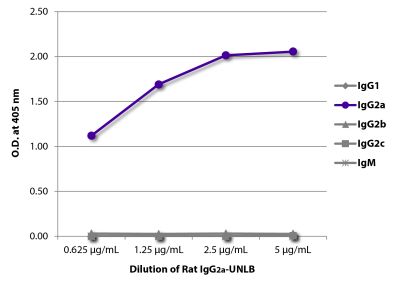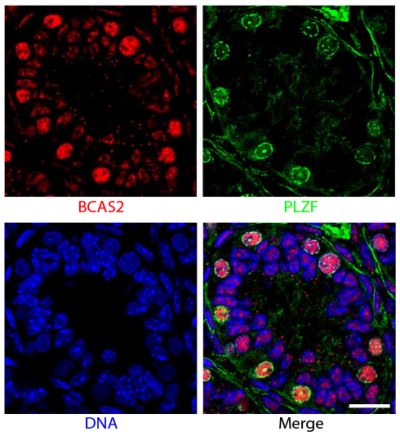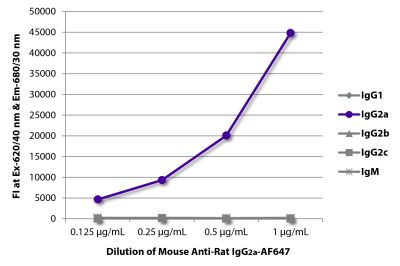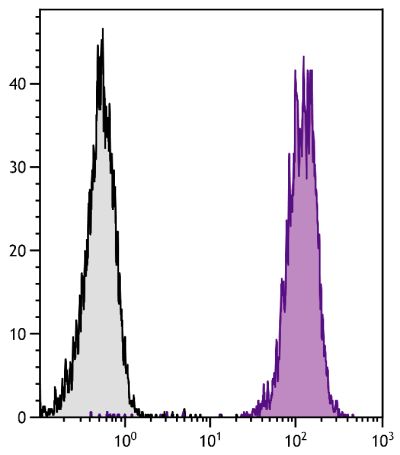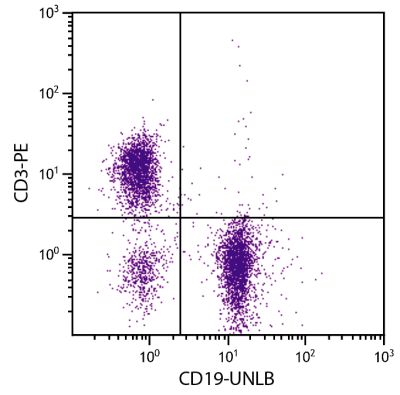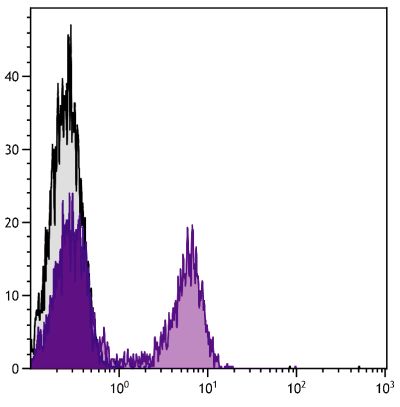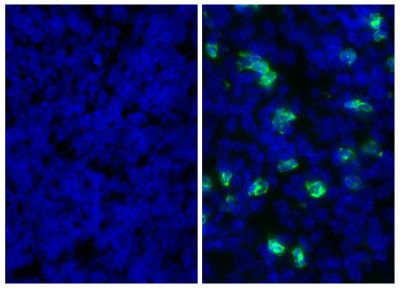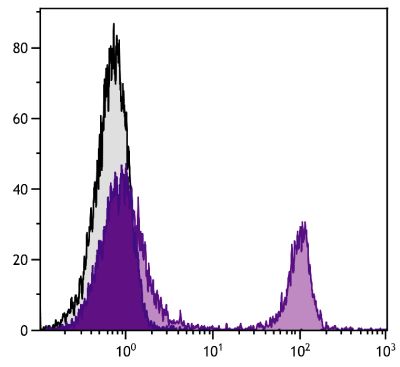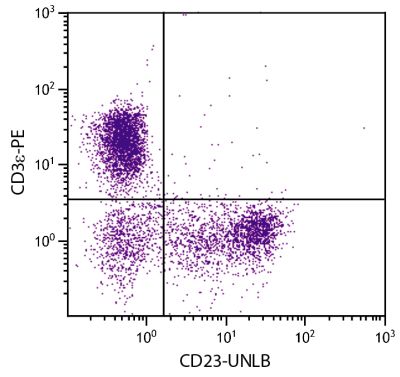Rat Anti-Mouse CD19-UNLB (6D5)
Cat. No.:
1575-01
Purified Anti-Mouse CD19 antibody for use in flow cytometry, immunohistochemistry, immunoprecipitation, and separation assays.
$261.00
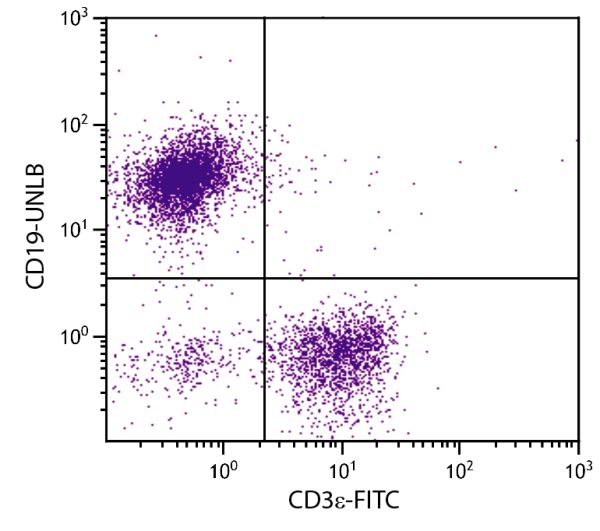

| Clone | 6D5 |
|---|---|
| Isotype | Rat (Lewis) IgG2aκ |
| Isotype Control | Rat IgG2a-UNLB (KLH/G2a-1-1) |
| Specificity | Mouse CD19 |
| Alternative Names | B4, Leu-12 |
| Description | CD19 is a monomeric transmembrane glycoprotein expressed at relatively constant levels throughout B cell development from early pro-B/pre-B cells (i.e. B220+/CD43+/HSA+) through fully differentiated B cell stages. Terminally differentiated plasma cells do not express CD19. In humans, the CD19 molecule on the surface of mature B cells associates with CD21 (CR-2) and CD81 (TAPA-1), and this multimolecular complex synergizes with surface immunoglobulin to provide signal transduction and promote cellular activation. All splenic and peritoneal IgM+ cells of both B-1 and B-2 lineages are CD19+, with B-1 cells expressing higher levels of CD19 than B-2 cells in these sites. Studies with CD19-deficient mice have suggested that this molecule may not be required for normal generation and maturation of B cells in the bone marrow. The monoclonal antibody 6D5 recognizes the same epitope as the published clone, 1D3. |
| Immunogen | Mouse CD19-expressing K562 human erythroleukemia cells |
| Conjugate | UNLB (Unconjugated) |
| Buffer Formulation | Borate buffered saline, pH 8.2 |
| Clonality | Monoclonal |
| Concentration | 0.5 mg/mL |
| Volume | 1.0 mL |
| Recommended Storage | 2-8°C |
| Applications |
Flow Cytometry – Quality tested 5-11 Immunohistochemistry-Frozen Sections – Reported in literature 2,3 Immunoprecipitation 12 Separation – Reported in literature 4 |
| RRID Number | AB_2794947 |
| Gene ID |
12478 (Mouse) |
| Gene ID Symbol |
Cd19 (Mouse) |
| Gene ID Aliases | AW495831 |
| UniProt ID |
P25918 (Mouse |
| UniProt Name |
CD19_MOUSE (Mouse) |
Documentation
Certificate of Analysis Lookup
Enter the Catalog Number and Lot Number for the Certificate of Analysis you wish to view
- 1. Krop I, de Fougerolles AR, Hardy RR, Allison M, Schlissel MS, Fearon DT. Self-renewal of B-1 lymphocytes is dependent on CD19. Eur J Immunol. 1996;26:238-42. (Immunogen)
- 2. Xia RH, Yosef N, Ubogu EE. Clinical, electrophysiological and pathologic correlations in a severe murine experimental autoimmune neuritis model of Guillain-Barré syndrome. J Neuroimmunol. 2010;219:54-63. (IHC-FS)
- 3. Ubogu EE, Yosef N, Xia RH, Sheikh KA. Behavioral, electrophysiological, and histopathological characterization of a severe murine chronic demyelinating polyneuritis model. J Peripher Nerv Syst. 2012;17:53-61. (IHC-FS)
- 4. Lindsey JW. Dexamethasone-induced Ras-related protein 1 is a potential regulatory protein in B lymphocytes. Int Immunol. 2007;19:583-90. (Sep)
- 5. Kline GH, Hayden TA, Riegert P. The initiation of B cell clonal expansion occurs independently of pre-B cell receptor formation. J Immunol. 2001;167:5136-42. (FC)
- 6. Yan S, Rodriguez-Barbosa J, Pabst O, Beckmann JH, Brinkmann V, Förster R, et al. Protection of mouse small bowel allografts by FTY720 and costimulation blockade. Transplantation. 2005;79:1703-10. (FC)
- 7. Berberich S, Förster R, Pabst O. The peritoneal micromilieu commits B cells to home to body cavities and the small intestine. Blood. 2007;109:4627-34. (FC)
- 8. Im JS, Arora P, Bricard G, Molano A, Venkataswamy MM, Baine I, et al. Kinetics and cellular site of glycolipid loading control the outcome of natural killer T cell activation. Immunity. 2009;30:888-98. (FC)
- 9. You Y, Zhao H, Wang Y, Carter RH. Cutting edge: Primary and secondary effects of CD19 deficiency on cells of the marginal zone. J Immunol. 2009;182:7343-47. (FC)
- 10. He X, Nair A, Mekasha S, Alroy J, O'Connell CM, Ingalls RR. Enhanced virulence of Chlamydia muridarum respiratory infections in the absence of TLR2 activation. PLoS One. 2011;6(6):e20846. (FC)
- 11. Jacobsen J, Haabeth OW, Tveita AA, Schjetne KW, Munthe LA, Bogen B. Naive idiotope-specific B and T cells collaborate efficiently in the absence of dendritic cells. J Immunol. 2014;192:4174-83. (FC)
- 12. Personal communication (IP)
See All References


